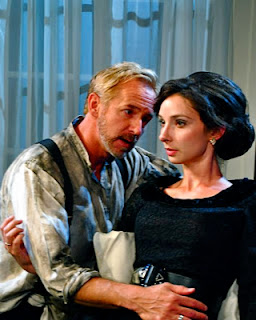DEATH IS JUST AROUND THE CORNER
The Addams Family
July 31 – August 12, 2012, 7:30 pm
Benedum Center, Pittsburgh Presented by: Pittsburgh Civic Light Opera
By Tamar Cerafici
The Barefoot Barrister
I tried to dislike the new Addams Family musical. First, if one is of a certain age, there is the irresistible urge to cross one’s forearms and snap during the overture, despite the cliché. Second, Gomez is not Raul Julia, which makes one sad that the Great Light of Independent Film has been dead for almost 20 years.
After a sniff or two, and fond thoughts to Jackie Coogan wafting skyward, one is ready to settle in and give this modern effort half a chance.
Here’s why:
 |
The Cast
Photos are courtesy the CLO website, By Jeremy Daniel |
1. THE SET is introduced by a blood-red curtain evoking Le Grand Guignol, a Parisian theatre dedicated to surreal horror plays in the early 20th Century. That curtain is as much a character as the puppeteers who manage various monsters. It hangs ominously: shifting, dropping, and lifting to reveal action. One of the tassels even plays a vital role in an ensuing romance. It certainly does set some expectations of macabre goings-on.
That I got this made me feel smart.
The puppetry within the play also is a nod to the theatre (guignol is French for “puppet”); it’s the creative highlight of the show.
2. THE CAST, including Douglas Sills, who valiantly succeeds as not Raul Julia/John Astin Gomez Addams. His family, with several generations of dead Addamses, plays an excellent support system.
Super-funny Sara Gettelfinger is a bit constrained as Morticia. Given her turns in shows like Grey Gardens and Nine, one would expect a broader comic turn. Instead, she must play Gomez’s straight-woman. That is, like, totally wrong.
The remarkably gifted trio of “normal people,” the Beineke family from Ohio, could have handled it all by themselves. Played to the hilt by Martin Vidnovic, Gaelen Gilliland, and Brian Justin Crum, the Beinekes are the “real Americans” that supposedly contrast brightly with the macabre sensibilities of the Addamses. As a unit, they are the straight man, and the book would have been more Addams-like if that family had been given more to do than reform their definition of normal.
Individually, Gilliland is delightful, although I can’t resist a favorable comparison to Faith Prince. (A Pittsburgh native, one wonders if she’s responsible for some of the dialogue during the retelling of Morticia’s and Gomez’s romance.)
 |
Blake Hammond as Fester
Photos are courtesy the CLO website, By Jeremy Daniel |
The rest of the Addams Clan is superb. Fester, allocated the role of Greek Chorus, deus ex machina, and narrator, is rendered lovingly by Blake Hammond. Pugsley (Patrick D. Kennedy), Grandma (Pippa Peartree) and Lurch (Tom Corebiel) do their turns with affection and real skill.
3. THE BOOK AND MUSIC are fun in their attempt to capture the joi-de-vivre (Tish, that French!) of the Addams franchise.
As for the plotline, the play quickly decomposes into a re-do of Kaufman and Hart’s You Can’t Take it With You. (I must credit L.A. Times reviewer David C. Nichols for the comparison. Those familiar with the 1930’s masterpiece will recognize similarities.) That’s not to say it isn’t charming and fun to watch, I just get the feeling I’ve seen this before, with Jean Arthur and Jimmy Stewart.
Thus what could be a macabre and slightly weird homage is merely a wonderful piece of fluff, perfect for a summer evening.
This unwonted fluffiness is due in part to the rather conventional and really unlikely development of Wednesday Addams as the ingénue. The really, truly, unlikely but necessary reversal is made completely believable by Cortney Wolfson’s sincere and fierce performance, complemented by the light tenor and obvious chemistry of Brian Justin Crum.
 |
Happy EndingPhotos are courtesy the CLO website, By Jeremy Daniel
|
But Wednesday? The adorably morbid child made maudlin, yellow-wearing spectacle by puberty and Love? Though Fester warns (“But Love”), even subsequent duets (“I’m Crazier Than You) still left me wanting a less conventional plotline.
On the other Thing, I mean, hand: the musical’s missed potential is obvious in Morticia’s “Death Is Just Around the Corner,” where Gettelfinger finally gets a chance to let loose her comic genius. Fester’s “The Moon and Me” is a clever oasis.
To my delight, the show was peppered with familiar references to original Addams
cartoons (compare the Act One dinner scene at www.CharlesAddams.com). For example, Mortcia offers comfort: “life is a tightrope, my son, and on the other side is your coffin.”
Before you get into yours, make sure you see The Addams Family at the Benedum. Despite its weaknesses, it has a quirky appeal that makes haunting the Cultural District on a sultry August night totally worthwhile.
Tamar Cerafici is an environmental lawyer whose national practice includes nuclear power and sustainable development consulting. She is the author of “Dominate: How Lawyers Crush Their Competition (with these 4 Powerhouse Marketing Techniques),” and the founder of The-Barefoot-Barrister.com as well as LegalShoe, and The Lawyer’s New Clothes, new media channels on PositivelyPittsburghlivemagazine.com that teach lawyers how to build enterprises and find balance in their practices without selling their souls.














